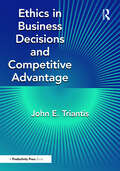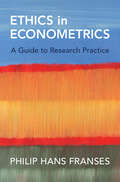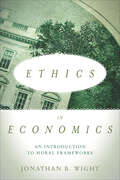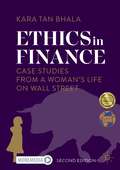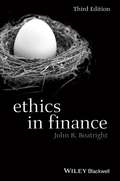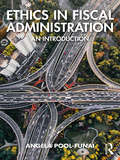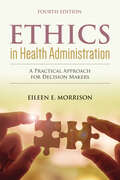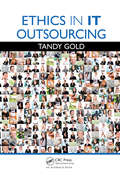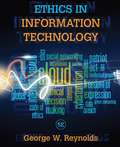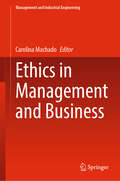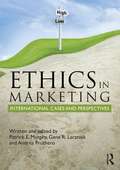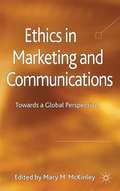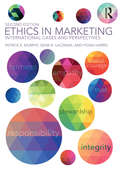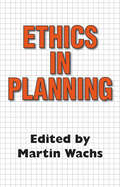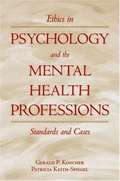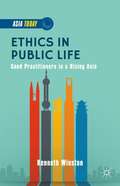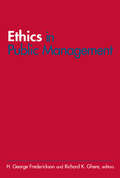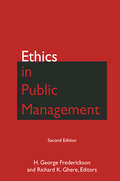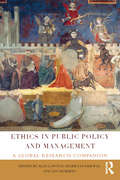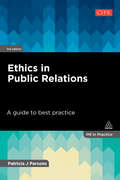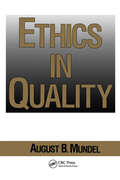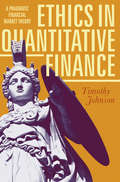- Table View
- List View
Ethics in Business Decisions and Competitive Advantage
by John E. TriantisBusiness ethics is the set of practices and policies that companies use to guide them through decisions about finances, negotiations and deals, corporate social responsibility, and more. Without a strong set of ethics, a business can run afoul of the law and encounter financial pitfalls and moral dilemmas. The objective of this book is a practical, fair, balanced, and objective treatment of the role of ethics in the business performance of companies in competitive markets that demonstrates how ethics affects business culture, strategy, decision-making, and value creation, which then determine competitiveness and business viability. The universality of corruption and the prevalence of unethical conduct is the background from which the narrative describes how ethical issues enter all functional areas. The ethics’ effects on the complexity of decisions and challenges are examined and the questions of why bother with ethical business and whether businesses invite government regulation are answered. Next, a framework is developed to identify and trace links and influences of business ethics on strategic decisions, corporate culture, and decision-making. The effects of strategy and culture on key business success factors and their interdependence are reviewed along with those with competitive advantage elements. These assessments then form the basis of characterizing competitive advantage in the framework developed. Decision-making and strategy links with competitive advantage elements and the inter-competitive advantage element interactions are evaluated along with competitive advantage organizational effects. The uniqueness of this book is the creation of a method to identify and assess how ethics impacts business decisions and competitive advantage based on accepted economic tenants. It lays the plan for quantitative assessments of the impact of ethical behavior, and it is written from the perspective of a business economist. Other books deal with business ethics elements only; none explains how ethics’ effects permeate business sustainability. The main contribution of this book is demonstrating that ethics is a necessary factor for business sustainability. It provides insights to regulators at all government levels, counterbalances ethicist claims about business ethics, and points out how ethical business conduct affects the economy.
Ethics in Danish Energy Policy (Routledge Studies in Energy Policy)
by Bo Poulsen Finn Arler Mogens Rüdiger Karl Sperling Kristian Høyer ToftThis book deepens our understanding of ethical drivers in energy policy and contributes to future decision-making on transitions towards a sustainable energy system. During the latest fifty years Western energy politics have been faced with a series of ethical challenges including rapid growth, oil crises, security of supply, nuclear power and climate change. Combining philosophical, historical and planning approaches into one narrative, these dilemmas are explored using Denmark as the key case study. Drawing on contributions from several experts in the field, the ethics of energy is investigated from multiple perspectives at the individual, corporate, local and national levels, focusing on concrete decisions where different ethical considerations are weighted against each other. This comprehensive approach helps to gain a deeper understanding of the energy sector’s history and gives important input to its future layout. Drawing comparisons with European and global examples, this book will be of great interest to students and scholars of energy politics and policy, environmental ethics, climate change and sustainability transitions.
Ethics in Econometrics: A Guide to Research Practice
by Philip Hans FransesApplied econometrics uses the tools of theoretical econometrics and real-word data to develop predictive models and assess economic theories. Due to the complex nature of such analysis, various assumptions are often not understood by those people who rely on it. The danger of this is that economic policies can be assessed favourably to suit a particular political agenda and forecasts can be generated to match the needs of a particular customer. Ethics in Econometrics argues that econometricians need to be aware of potential ethical pitfalls when carrying out their analysis and that they need to be encouraged to avoid them. Using a range of empirical examples and detailed discussions of real cases, this book provides a guide for research practices in econometrics, illustrating why it is imperative that econometricians act ethically in terms of the way they conduct their analysis and treat their data.
Ethics in Economics: An Introduction to Moral Frameworks
by Jonathan B. WightIn Ethics in Economics , Jonathan B. Wight provides an overview of the role that ethical considerations play in economic debates. Whereas much of the field tends to focus on welfare outcomes, Wight calls for a deeper examination of the origin and evolution of our moral norms. He argues that economic life relies on three interrelated ethical systems: outcome-based, duty- and rule-based, and virtue-based. Integrating contemporary theoretical and applied research on ethics within a historical framework, Wight provides a thorough and accessible outline of all three schools, explaining how they fit or contrast with the economic welfare model. The book then uses these conceptual underpinnings to examine a range of contemporary topics, such as the 2008 financial crisis, the moral limits to markets, the findings of experimental economics, and the nature of economic justice. Wight's analysis is guided by the innovative concept of ethical pluralism—the recognition that each system has appropriate applications, and that no one prevails. He makes the case that considering a wider moral framework, rather than concentrating on utility maximization, can lead to a richer understanding of human behavior and better policy decisions. An incisive overview in a blossoming area of interest within Economics, this book is ideal for undergraduates or uninitiated readers who seek an introduction to this topic.
Ethics in Finance: Case Studies from a Woman’s Life on Wall Street
by Kara Tan BhalaThis book comprises multiple finance and ethics case studies. The purpose of the book is twofold. First, the case studies teach readers how to evaluate and determine resolutions to ethical issues in finance. Second, the reader will enjoy a journey with the author, a woman, over her years working in finance, through the use of case studies.These studies focus on ethical issues in finance which the author encountered over nearly a 30-year career in the industry. There are 10 case studies extracted from different sectors of finance. This broad range is a consequence of the author’s experience from almost all sides of the business: the buy side, the sell side, equity research in Asia, equity sales, mutual funds, hedge funds, the finance academy, and consulting.Each case study has an engaging narrative describing the background, transactions, players, and ethical issues. The ethical issue is analyzed and resolved using the appropriate theories of moral philosophy. Descriptions and analyses are rigorous yet comprehensible, approachable, and entertaining.Apart from ethics determinations, the material in the book covers and explains a variety of specific, and even complex, financial transactions. In every transaction there is an explanation of the roles of various players involved. In this way, readers will learn about the work of people in different positions in finance from investment bankers and equity traders to portfolio managers and equity analysts. Through these case studies, readers also will get an understanding of major financial transactions and activities such as IPOs, secondary offerings, equity trading, and equity valuations.The book will appeal to practitioners, college and high school students, and lecturers who can use it to supplement courses in finance or business ethics.
Ethics in Finance: Case Studies from a Woman’s Life on Wall Street
by Kara Tan BhalaThis award-winning book comprises multiple finance and ethics case studies. The purpose of the book is twofold. First, the case studies teach readers how to evaluate and determine resolutions to ethical issues in finance. Second, the reader will enjoy a journey with the author, a woman, over her years working in finance, through the use of case studies.Prefaced by the additional of video introductions, these studies focus on ethical issues in finance which the author encountered over nearly a 30-year career in the industry. There are 10 case studies extracted from different sectors of finance. This broad range is a consequence of the author’s experience from almost all sides of the business: the buy side, the sell side, equity research in Asia, equity sales, mutual funds, hedge funds, the finance academy, and consulting.Each case study has an engaging narrative describing the background, transactions, players, and ethical issues. The ethical issue is analyzed and resolved using the appropriate theories of moral philosophy. Descriptions and analyses are rigorous yet comprehensible, approachable, and entertaining.Apart from ethics determinations, the material in the book covers and explains a variety of specific, and even complex, financial transactions. In every transaction there is an explanation of the roles of various players involved. In this way, readers will learn about the work of people in different positions in finance from investment bankers and equity traders to portfolio managers and equity analysts. Through these case studies, readers also will get an understanding of major financial transactions and activities such as IPOs, secondary offerings, equity trading, and equity valuations. The book will appeal to practitioners, college and high school students, and lecturers who can use it to supplement courses in finance or business ethics.
Ethics in Finance: Critical Issues In Theory And Practice (Foundations of Business Ethics #1)
by John R. BoatrightThe third edition of Ethics in Finance presents an authoritative and wide-ranging examination of the major ethical issues in finance. This new edition has been expanded and thoroughly updated with extensive coverage of the recent financial crisis and the very latest developments within the financial world. Substantially updated new edition with nearly 40% new material, including sections on credit cards, mortgage lending, microfinance, risk management, derivatives, and securitization Includes coverage and references to the recent financial crisis and the very latest developments within the financial world Focuses on the practical issues that confront finance professionals, policy makers, and consumers of financial services Cites examples of the scandals that have shaken public confidence in Wall Street and world financial markets Includes numerous examples throughout to illustrate the concepts and issues described within the text
Ethics in Fiscal Administration: An Introduction
by Angela Pool-FunaiEthics in Fiscal Administration: An Introduction integrates ethics into the public administration curriculum by weaving ethical dilemmas into the financial management and budgeting process of the public and nonprofit sectors. Inquiry-based discussion prompts challenge students to examine scenarios that they are likely to encounter in professional public service careers. Critics of the public sector often use the analogy that government should be run more like a business. Issues such as profitability versus social value preclude the public sector from becoming a mirror image of the private sector; however, ethical decision making in fiscal administration is an important concern across sectors. Using examples drawn from the public and nonprofit arenas, Ethics in Fiscal Administration: An Introduction will help prepare future budget managers and other public administrators for the important work of upholding the public financial trust.
Ethics in Health Administration: A Practical Approach for Decision Makers
by Eileen E. MorrisonGiven the many advances in technology as well as the ongoing discussion of health care reform post-Affordable Care Act, today’s healthcare administrators require a strong foundation in practice-based ethics to confront the challenges of the current healthcare landscape. Ethics in Health Administration, Fourth Edition focuses on the application of ethics to the critical issues faced by today's healthcare administrators. After establishing a foundation in the theory and principles of ethics, the text encourages students to apply ethics to such areas change, regulation, technology and fiscal responsibility. Thoroughly updated, the Fourth Edition includes 12 new, contemporary case studies that encourage students to apply ethics. A new chapter on the Ethics in the Epoch of Change stresses major changes in healthcare, including the digital revolution, population health, ethics temptations and ethic resilience. Other chapters have been revised to include new cases, and more.
Ethics in IT Outsourcing (Applied Software Engineering Series)
by Tandy GoldIn IT divisions and organizations, the need to execute in a competitive and complex technical environment while demonstrating personal integrity can be a significant personal and organizational challenge. Supplying concrete guidelines for those at an ethical crossroads, Ethics in IT Outsourcing explores the complex challenges of aligning IT outsour
Ethics in Information Technology (Fifth Edition)
by George ReynoldsGain a strong understanding of the legal, ethical, and societal implications of information technology with Reynolds' ETHICS IN INFORMATION TECHNOLOGY, Fifth Edition. The latest edition of this dynamic text provides up-to-date, thorough coverage of notable technology developments and their impact on business today. You will examine issues surrounding professional codes of ethics, file sharing, infringement of intellectual property, security risk assessment, Internet crime, identity theft, employee surveillance, privacy, compliance, social networking, and the ethics of IT corporations. This book offers an excellent foundation in ethical decision-making for current and future business managers and IT professionals. Unlike typical introductory Information Systems books that cover ethical issues only briefly, ETHICS IN INFORMATION TECHNOLOGY provides thorough coverage to prepare the individuals responsible for addressing ethical issues in today's workplace. You will learn how to examine ethical situations that typically arise in IT and gain practical advice for addressing the relevant issues. Up-to-the-minute business vignettes and thought-provoking questions challenge your knowledge, while features focused on decision-making--including updated Manager's Checklists--provide brief, critical points to consider in making key business decisions. Trust ETHICS IN INFORMATION TECHNOLOGY, Fifth Edition, to equip you with the understanding of IT and ethics needed for confident decision-making and professional success.
Ethics in Investment Banking
by John N. Reynolds Edmund NewellThe financial crisis focused unprecedented attention on ethics in investment banking. This book develops an ethical framework to assess and manage investment banking ethics and provides a guide to high profile concerns as well as day to day ethical challenges.
Ethics in Management and Business (Management and Industrial Engineering)
by Carolina MachadoThis book explores ethical decision-making within the business landscape. Covering key facets such as ethical dilemmas, organizational culture, and Corporate Social Responsibility (CSR), the text delves into strategies for implementation, social impact measurement, and challenges and benefits. Transparency and accountability mechanisms are discussed alongside the role of leadership in promoting ethics and maintaining an ethical organizational culture. The importance of diversity and inclusion, compliance, and ethical governance are highlighted, providing insights into strategies for promotion and the impact on financial performance. The book also navigates through ethical challenges in the supply chain, responsible innovation, digital ethics, and privacy. Additionally, readers gain valuable perspectives on facing ethical challenges, the role of leadership in crises, and the impact of ethics on financial results. Case studies in specific sectors, including technology, health care, and finance, offer practical insights into ethical practices and strategies to promote ethics within diverse industries. This book serves as an essential guide for individuals and organizations committed to navigating the complex landscape of ethical decision-making in the business world.
Ethics in Marketing
by Patrick E. Murphy Gene R. LaczniakUnderstanding and appreciating the ethical dilemmas associated with business is an important dimension of marketing strategy. Increasingly, matters of corporate social responsibility are part of marketing's domain. Ethics in Marketing contains 20 cases that deal with a variety of ethical issues such as questionable selling practices, exploitative advertising, counterfeiting, product safety, apparent bribery and channel conflict that companies face across the world. A hallmark of this book is its international dimension along with high-profile case studies that represent situations in European, North American, Chinese, Indian and South American companies. Well known multinationals like Caterpillar, Coca Cola, Cadbury and Facebook are featured. The two introductory chapters cover initial and advanced perspectives on ethical and socially responsible marketing, in order to provide students with the necessary theoretical foundation to engage in ethical reasoning. A decision-making model is also presented, for use in the case analyses. This unique case-book provides students with a global perspective on ethics in marketing and can be used in a free standing course on marketing ethics or marketing and society or it can be used as a supplement to the readings for other marketing classes.
Ethics in Marketing and Communications
by Mary M. MckinleyThis book takes an international perspective on the topical issues of marketing ethics and ethical communications. The contributors are professors of business in various European institutions who bring their international background and experience to this body of work.
Ethics in Marketing: International cases and perspectives
by Patrick E. Murphy Gene R. Laczniak Fiona HarrisUnderstanding and appreciating the ethical dilemmas associated with business is an important dimension of marketing strategy. Increasingly, matters of corporate social responsibility are part of marketing's domain. Ethics in Marketing contains 20 cases that deal with a variety of ethical issues such as questionable selling practices, exploitative advertising, counterfeiting, product safety, apparent bribery and channel conflict that companies face across the world. A hallmark of this book is its international dimension along with high-profile case studies that represent situations in European, North American, Chinese, Indian and South American companies. Well known multinationals like Coca Cola, Facebook, VISA and Zara are featured. This second edition of Ethics in Marketing has been thoroughly updated and includes new international cases from globally recognized organizations on gift giving, sustainability, retail practices, multiculturalism, sweat shop labor and sports sponsorship. This unique case-book provides students with a global perspective on ethics in marketing and can be used in a free standing course on marketing ethics or marketing and society or it can be used as a supplement for other marketing classes.
Ethics in Planning
by Martin WachsSome planners limit discussions of ethics to simple, though important, questions about the propriety of their daily activities. This approach to ethics restricts discussion of professional ethics to the propriety of everyday social and professional relationships. It ignores the broader ethical content of planning practice, methods, and policies. While narrow definitions of ethical behavior can easily preoccupy public officials and professional associations, they divert attention from more profound moral issues.Martin Wachs argues that ethical issues are implicit in nearly all planning decisions. For illustrative and educational reasons, it is useful to divide ethics in planning into four distinct categories. The first category includes the moral implications of bureaucratic practices and rules of behavior regarding clients and supervisors. The second category includes ethical judgments which planners make in exercising their "administrative discretion." More complex, and represented by a third category, are the moral implications of methods and the ethical content of criteria built into planning techniques and models. The final type represents the basic choices which society makes - those inherent in the consideration of major policy alternatives.Ethics in Planning contains a variety of representative papers to capture the current state of thinking. This book will be important as a text for survey classes in professional ethics given by university planning programs. It should also supplement short courses in planning ethics for practicing professionals and provide source materials for discussions of planning ethics sponsored by local chapters of the American Planning Association and similar organizations. It gathers together exemplary and critical works, thus it will also interest individual planners in a field that only continues to grow in recognition and importance.
Ethics in Psychology and the Mental Health Professions: Standards and Cases (3rd edition)
by Patricia Keith-Spiegel Gerald P. KoocherWe seek to present the full range of contemporary ethical issues in the mental health professions, not only as relevant and intriguing but also as integral and unavoidable aspects of the our complex professional roles and social responsibilities. Regardless of one's training speciality or the work setting, critical dilemmas will arise -- probably with some regularity--and we will often need to make challenging decisions or take intervention steps, sometimes right on the spot.
Ethics in Public Life
by Kenneth WinstonThe topic of moral competence is generally neglected in the study of public management and policy, yet it is critical to any hope we might have for strengthening the quality of governance and professional practice. What does moral competence consist in? How is it developed and sustained? These questions are addressed in this book through close examination of selected practitioners in Asian countries making life-defining decisions in their work. The protagonists include a doctor in Singapore, a political activist in India, a mid-level bureaucrat in central Asia, a religious missionary in China, and a journalist in Cambodia--each struggling with ethical challenges that shed light on what it takes to act effectively and well in public life. Together they bear witness to the ideal of public service, exercising their personal gifts for the well-being of others and demonstrating that, even in difficult circumstances, the reflective practitioner can be a force for good.
Ethics in Public Management
by H George Frederickson Richard K GhereThe groundbreaking "Ethics in Public Administration" set the agenda for a decade's worth of research in the theory and practice of ethics in the public sector. This long-awaited follow-up volume represents the state of the art in research on administrative ethics. It features all new contributions by many of the leading figures in the field, and addresses both the managerial and individual/moral dimensions of ethical behavior as well as new challenges to administrative ethics posed by globalization. A detailed introduction, opening passage, and conclusion lend context to each of the book's four main sections. "Ethics in Public Management" is must reading for any graduate level course in public sector ethics.
Ethics in Public Management
by H George Frederickson Richard K GhereThe first edition of this work, published in 1993, refuted the notion that administrative ethics could not be studied empirically. In this second edition, Frederickson (public administration, University of Kansas) and Ghere (political science, University of Dayton) expand their scope to include both the managerial and individual/moral dimensions of ethical behavior, and add a new section on administrative ethics and globalization. Other sections cover organizational designs that support ethical behavior, market forces that compromise administrative ethics, and unintended outcomes of anticorruption reforms. The book is appropriate for a graduate course in public sector ethics.
Ethics in Public Policy and Management: A global research companion
by Leo Huberts Zeger van der Wal Alan LawtonEthics in Public Policy and Management: A global research companion showcases the latest research from established and newly emerging scholars in the fields of public management and ethics. This collection examines the profound changes of the last 25 years, including the rise of New Public Management, New Public Governance and Public Value; how these have altered practitioners’ delivery of public services; and how academics think about those services. Drawing on research from a broad range of disciplines, Ethics in Public Policy and Management looks to reflect on this changing landscape. With contributions from Asia, Australasia, Europe and the USA, the collection is grouped into five main themes: theorising the practice of ethics; understanding and combating corruption; managing integrity; ethics across boundaries; expanding ethical policy domains. This volume will prove thought-provoking for educators, administrators, policy makers and researchers across the fields of public management, public administration and ethics.
Ethics in Public Relations: A Guide to Best Practice
by Patricia J ParsonsEthical practice in any professional discipline is guided by age-old philosophical perspectives, but its modern parameters are continually evolving. Ongoing developments in technology, social media and social contexts mean that public relations and its practices are constantly changing, and so do the ethical questions faced by practitioners in the field. Ethical questions and dilemmas are inherent to public relations, and ensuring that practitioners operate ethically is fundamental to the professionalism and credibility of the field. Engaging and accessible, Ethics in Public Relations offers a lively exploration of the key ethical concerns present in the public relations world today by way of practical tips and guidance to support those in PR and corporate communications. Written by a leading academic in the field, this fully updated third edition of Ethics in Public Relations includes an entirely new chapter on the uses of ethics in social media, covering topical issues such as blogger engagement and the relationship between employee social media activity and organizational reputation.
Ethics in Quality
by August B. MundelThis book poses essential questions on ethical quality and regarding the best action to take when dealing with a company, which has adopted a course of action that may lead it to act in an "irresponsible" manner. It is intended for quality engineers and product liability attorneys.
Ethics in Quantitative Finance
by Timothy JohnsonThis book presents an ethical theory for financial transactions that underpins the stability of modern economies. It combines elements from history, ethics, economics and mathematics to show how these combined can be used to develop a pragmatic theory of financial markets. Written in three sections; section one examines the co-evolution of finance and mathematics in an ethical context by focusing on three periods: pre-Socratic Greece, Western Europe in the thirteenth century and North-western Europe in the seventeenth century to demonstrate how the historical development of markets and finance were critical in the development of European ideas of science and democracy. Section two interprets the evidence presented in section one to provide examples of the norms reciprocity, sincerity and charity and introduce the pragmatic theory. Section three uses the pragmatic theory to interpret recent financial crises, address emergent phenomena and relate the theory to alternative contemporary theories of markets. Presenting a unique synthesis of mathematical and behavioural approaches to finance this book provides explicit ethical guidance that will be of interest to academics and practitioners alike.
